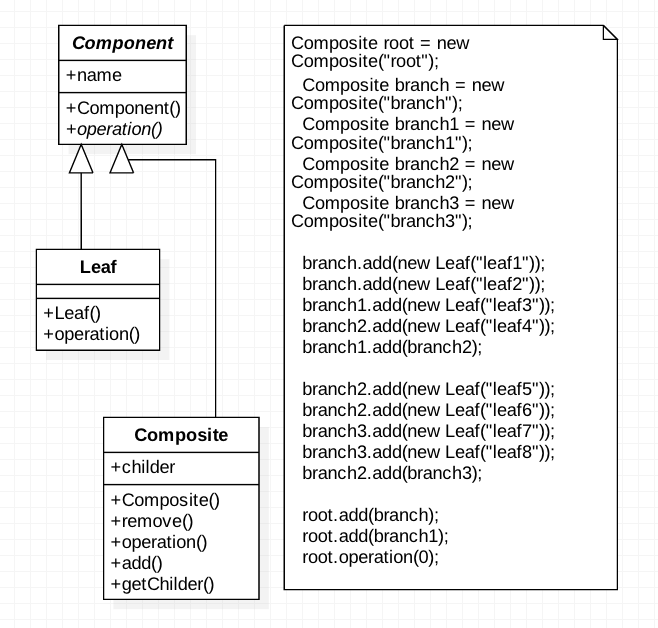设计模式 - 组合模式
About 2 minpattermjava
已经有一段时间没有写模式了,在把迭代器模式写了之后,本应该是写组合模式的,但是组合模式涉及到递归,感觉很麻烦,于是就跳跃了,没有及时写下来,之后看了代理模式,复合模式等。都没有记录下来。现在是时候好好理一下这些模式了,昨天复习了下之前的模式,特别感觉工厂方法和抽象工厂都有些模糊了。看来要努力了,加油!
一、对组合模式的理解
组合模式定义:允许你将对象组合成树形结构来表现“整体/部分”层次结构。组合能让客户以一致的方式处理个别对象以及对象集合。
个人理解就是处理树形结构集合的一种模式 就想树一样,是有根,有无数的树枝,无数的叶子,一成一层的,就像电脑文件夹一样
二、代码实现
实现抽象类
// 抽象组合类
public abstract class Component {
String name;
public Component(String name) {
this.name = name;
}
public abstract void operation(int index); // 操作
}
实现叶子类,继承抽象组合类
// 叶子
public class Leaf extends Component{
public Leaf(String name) {
super(name);
// TODO Auto-generated constructor stub
}
@Override
public void operation(int index) {
String str = "";
for (int i=0; i<index; i++) {
str = str+ " ";
}
System.out.println(str + name);
}
}
实现树枝类,继承抽象组合类
public class Composite extends Component{
private LinkedList<Component> childer;
public Composite(String name) {
super(name);
this.childer = new LinkedList<>();
}
@Override
public void operation(int index) {
String str = "";
for (int i=0; i<index; i++) {
str = str+ " ";
}
LinkedList<Component> list = this.getChilder();
System.out.println(str + name);
for (Component c : list) {
c.operation(index+1);
}
}
public void add(Component com) {
this.childer.add(com);
}
public void remove(Component com) {
this.childer.remove(com);
}
public LinkedList<Component> getChilder(){
return this.childer;
}
}
main方法实现
public static void main(String[] args) {
Composite root = new Composite("root");
Composite branch = new Composite("branch");
Composite branch1 = new Composite("branch1");
Composite branch2 = new Composite("branch2");
Composite branch3 = new Composite("branch3");
branch.add(new Leaf("leaf1"));
branch.add(new Leaf("leaf2"));
branch1.add(new Leaf("leaf3"));
branch2.add(new Leaf("leaf4"));
branch1.add(branch2);
branch2.add(new Leaf("leaf5"));
branch2.add(new Leaf("leaf6"));
branch3.add(new Leaf("leaf7"));
branch3.add(new Leaf("leaf8"));
branch2.add(branch3);
root.add(branch);
root.add(branch1);
root.operation(0);
}
```
运行结果
```
root
branch
leaf1
leaf2
branch1
leaf3
branch2
leaf4
leaf5
leaf6
branch3
leaf7
leaf8
三、UML类图

四、笔记
oo原则
封装变化
多用组合,少用继承
针对接口编程,不针对实现编程
为交互对象之间的松耦合设计而努力
类应该对扩展开放,对修改关闭
依赖抽象,不依赖具体类
只和朋友交谈
别找我,我会找你
类应该只有一个改变的理由
组合模式:允许你将对象组成树形结构来表现“整体/部分”的层次结构,组合能让客户以一致的方式处理个别对象和对象组合。
组合也可以和迭代器一起使用